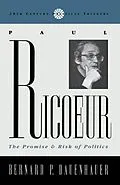Paul Ricoeur, with Rawls, Walzer, and Habermas as some of his main interlocutors, has developed a substantial and distinctive body of political thought. On the one hand, it articulates a rich conception of the paradoxical character of the domain of politics. On the other, it provides a fresh approach to such major topics as the relationship among politics, economics, and ethics and between concern for universal human rights and respect for cultural plurality. His work, rooted as it is in Aristotle, Kant, and Hegel, also provides resources for a fruitful rethinking of the issues at stake in the liberal-communitarian debate.
Autorentext
By Bernard P. Dauenhauer
Inhalt
Chapter 1 Roots: An Introduction
Chapter 2 Early Political Thought
Chapter 3 Conceptual Advances
Chapter 4 Action, Agents and Their Identities
Chapter 5 From the Ethical Aim to the Moral Norm
Chapter 6 From the Moral Norm to Practical Wisdom
Chapter 7 Political Fragility
Chapter 8 Political Responsibility
Chapter 9 Assessment
